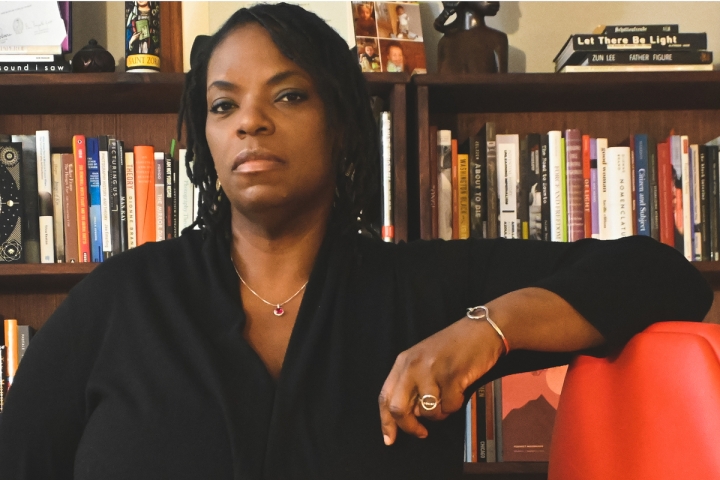A dynamic new Institute for Black Intellectual and Cultural Life has been created to serve as the nexus of the creative, cultural, and scholarly expression of the Black community at Dartmouth and beyond, President Sian Leah Beilock announced today.
Associate Professor of English and Creative Writing Kimberly Juanita Brown has been named the institute’s inaugural director.
The institute is the result of the collective efforts of faculty, administrators, staff, and alumni, and will host visiting scholars, artists, writers, activists, and postdoctoral fellows; provide research grants to Dartmouth faculty and staff; fund student internships; and sponsor events such as symposia, performances, and courses, among other activities.
“I’m pleased to announce the launch of this institute, which will play an important role in highlighting and supporting the notable work of Black academics and culture at Dartmouth and beyond,” says President Beilock.
Known as the IBICL, the institute is being launched with initial funding of $2.3 million, including $1 million raised from alumni, families, and friends through the Call to Lead campaign and $1.3 million from the Office of the Provost, which would also provide a further $400,000 to match funds raised during the initial period of operation.
The new cultural and academic hub will be housed on the second floor of Haldeman Center, in space formerly occupied by the Leslie Center for the Humanities.
“The institute will provide an important interdisciplinary foundation for the entire community on race and Black culture that will be a model for the Ivy League,” says Provost David Kotz ’86, who says one of the institute’s goals is to help Dartmouth recruit and retain Black faculty, staff, and students.
Senior Vice President and Senior Diversity Officer Shontay Delalue agrees.
“The creation of the Institute for Black Intellectual and Cultural Life is one of the key priorities of Toward Equity, and we are excited to develop it with and for the community,” Delalue says, referring to Dartmouth’s institutional strategic plan for diversity, equity, and inclusion, which was formally launched in early 2023.
As director, Brown will help focus the institute’s intellectual activities around a small number of multiyear interdisciplinary research pillars, such as slavery and justice, arts and activism, climate change, and histories of race at Dartmouth and in New England. The topics will build on faculty strengths and support collaborations with other centers, institutes, and programs on campus and beyond to develop public-facing research and creative projects related to Black history and culture.
“Dartmouth is the right place, and this is the right time for an institute that centers the research of Black studies in all of its iterations,” Brown says. “This moment calls for expansive vision and profound imagination, and this is what the institute endeavors to bring to Hanover. My goals are to create a space that fosters scholarly engagement and collaboration. I want the institute to be a thriving arena for the work of the Black diaspora, and I want to ensure its longevity.”

The institute will also serve as a cultural hub, hosting regular community lunches and dinners, supporting mentoring of Black students at the Shabazz Center for Intellectual Inquiry and through the Office of Pluralism and Leadership, fostering engagement with Black alumni, complementing the work of the Black Caucus employee resource network, and supporting reciprocal connections between Dartmouth and communities of color and other organizations in the Upper Valley and New England.
Brown, who specializes in African American and African diasporic literature and visual culture studies, joined the Dartmouth faculty in 2020 and served as co-director of the Consortium of Studies in Race, Migration, and Sexuality.
The author of two books—The Repeating Body: Slavery’s Visual Resonance in the Contemporary and the forthcoming Mortevivum: Photography and the Politics of the Visual—Brown came to Dartmouth from Mount Holyoke College, where she was the Elizabeth C. Small Associate Professor of English and Africana Studies and chair of the Department of Gender Studies. Previously, she was an assistant professor of English at Northeastern University.
Among her recent fellowships and awards, Brown is a Richard D. Cohen Fellow at the W.E.B. Du Bois Research Institute at Harvard’s Hutchins Center for African and African American Research and received a grant from the Graham Foundation for Advanced Studies in the Fine Arts. A graduate of Queens College, City University of New York, she earned her doctorate in African American studies and American studies from Yale, with a certificate in women’s, gender, and sexuality studies.
In addition to the director, who is a member of the faculty, the IBICL will be co-led by a full-time executive director. A search for the executive director is underway.
“It’s very encouraging to see this new initiative clear its initial funding hurdle and the College’s commitment to it. The institute, along with other Dartmouth social justice initiatives, promises to enrich future Dartmouth students, enhance inclusiveness and belonging, and help attract and retain more Black and other ethnically diverse faculty and staff, ” says Barry Caldwell ’82, one of the Call to Lead Executive Committee members who led the fundraising effort. “This is a special moment in the College’s history, and it’s gratifying to see the wide array of alumni across all regions, classes, and backgrounds supporting it.”
The institute is part of a $60 million, multifaceted set of programs announced by then-President Philip J. Hanlon ’77 in 2021, and equally supported by President Beilock, to advance racial equity and justice at Dartmouth and effect positive change within higher education and broadly across society.
